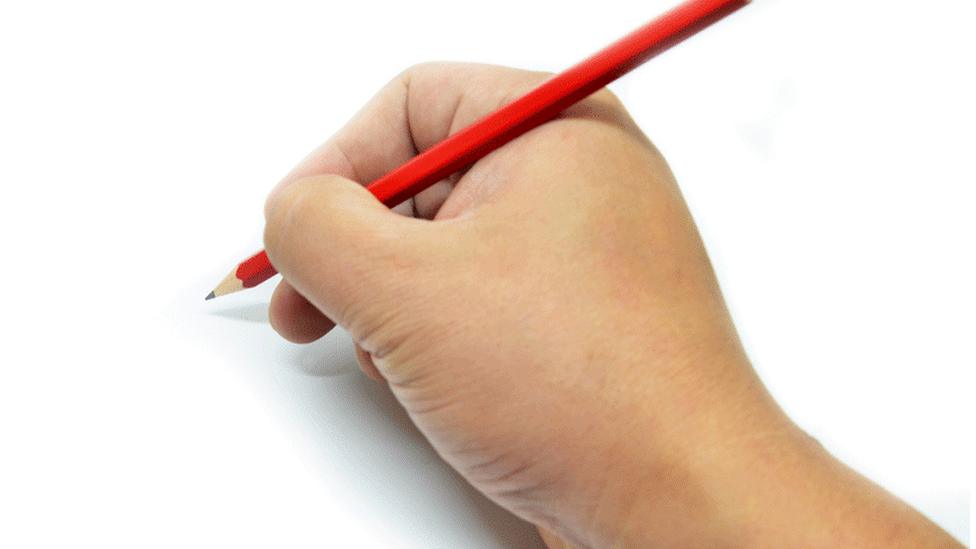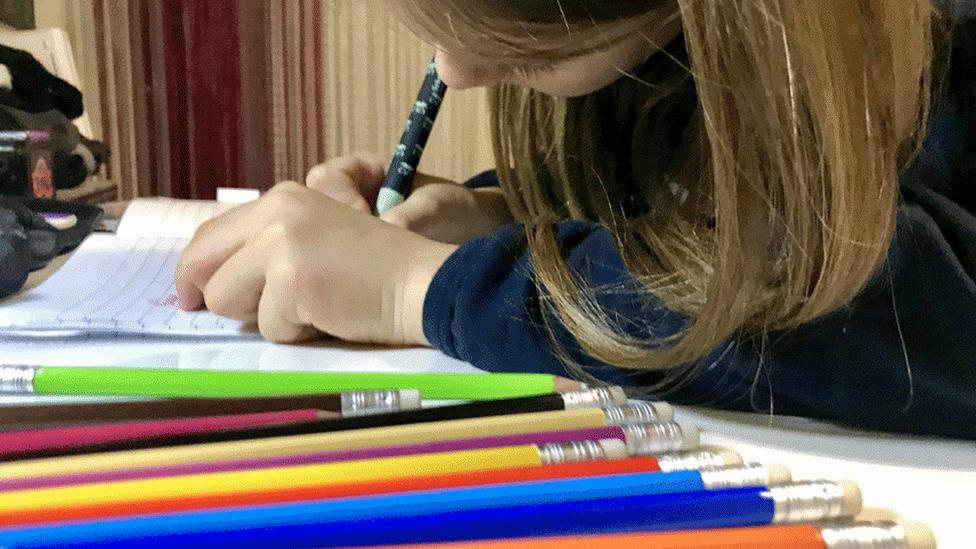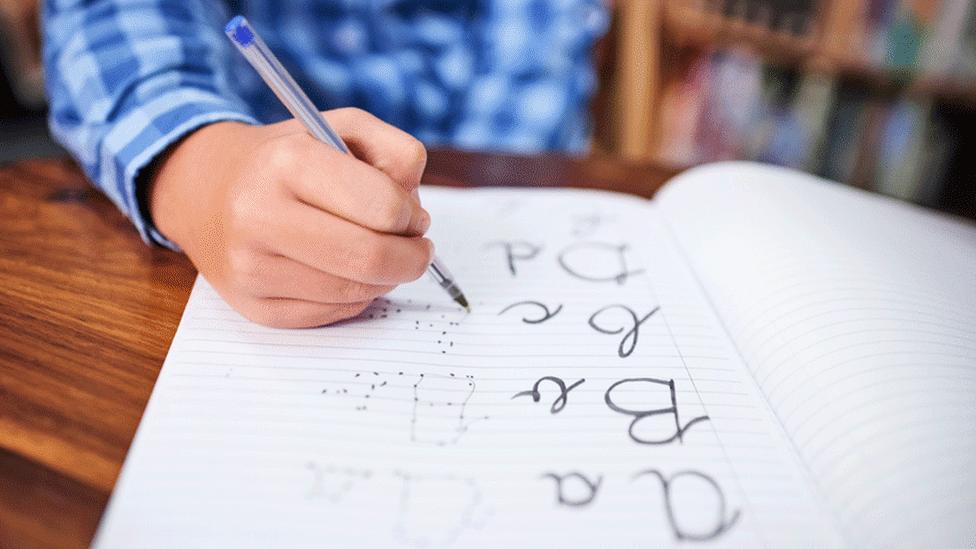Can kids hold pens in the digital age?
- Published

Children's habits are changing. Where once a toddler might have played with bricks, now they are more likely to play on an iPad.
Such devices can provide a welcome distraction for busy parents and an attractive source of sensory stimulation for young children but does it mean that children are not developing the fine motor skills they need to write?
Sally Payne, head paediatric occupational therapist at the Heart of England foundation NHS Trust has seen evidence this is the case.
She recently told the Guardian newspaper, external: "Children coming into school are being given a pencil but, increasingly, they are not able to hold it because they don't have the fundamental movement skills.
"To be able to grip a pencil and move it, you need strong control of the fine muscles in your fingers.
"Children need lots of opportunity to develop those skills," she added.
Ms Payne blamed the proliferation of tablets and smartphones in toddlers' lives for the children's inability to grip and hold a pencil.
"It's easier to give a child an iPad than encouraging them to do muscle-building play such as building blocks, cutting and sticking, or pulling toys and ropes," she said.
A few years ago a video clip , externalof a one-year-old baby girl frantically swiping at a magazine went viral, illustrating that children firmly inhabit a digital world.

Fine motor skills needed to hold a pencil can be developed in a range of real-world play
According to the communications regulator Ofcom, more than half of UK households own tablet devices, rising to 76% for smartphones.
Dr Jane Medwell is part of the Write Your Future campaign, external - a group championing the importance of handwriting.
She said that the proliferation of gadgets in homes meant that "some children don't get as much pencil play as they used to".
And habits learned from parents are changing too.

"The earliest thing you may see now is a parent texting on a phone while in the past it might have been someone writing a shopping list by hand, so children's experience of early literacy has changed," Dr Medwell explained.
But she does not believe the case is yet made for linking more tablet time to a lack of motor skills.
"We don't have research that says using a tablet means you can only swipe and not hold a pencil and we don't even know whether there are less pencils in homes," she said.
What there is evidence for though, is the importance of handwriting.
A 2005 study, external from the neuroscience laboratory at Aix-Marseille University divided 76 children aged three to five into two groups - one wrote by hand, the other using a computer.
The researchers found that the group that learned to write letters by hand were better at recognising them than the group that learned to type them on a computer.
And a 2016 study, published in the journal Psychological Science, external, found that students typing up notes from TED talks tended to take verbatim notes whereas those writing longhand were forced to be more selective.
While both remembered facts such as dates, the group that wrote notes were better at remembering conceptual questions.
For very young children, there are also huge benefits in writing.
"There is lots of good stuff on tablets and phones but children need the conventional literacy world too," said Dr Medwell.
"How you create a letter, how you make complex movements. It takes practice and it helps children learn literacy," she added.

Dr Mellissa Prunty, a lecturer in occupational therapy and the vice chair of the National Handwriting Association, is cautious about making a link between tablet/phone use and handwriting skills.
"There are other factors such as spelling and language development, but also how much handwriting children engage with at nursery or pre-school groups and how much writing they do at school," said Dr Prunty.
Most of the handwriting referrals she has in her clinic are from children with underlying conditions, such as Developmental Coordination Disorder, known as dyspraxia.
"What occupational therapists on the ground are observing now are children without any underlying impairments," she said.
"Although this is an interesting observation, we don't know from a research point of view if technology is impacting on fine motor skills generally and whether that is having a knock-on effect to handwriting."

Some countries are putting more emphasis on typing skills to equip digital natives for the job market
In 2015, Finland became one of the first countries in the world to stop making cursive handwriting classes compulsory.
The move was partly a recognition that keyboard skills were going to be far more useful to the current generation of digital natives.
Indian schools too have abandoned cursive writing in favour of clean, legible print.
By contrast, in late 2017 the US state of Illinois passed a law requiring school students to learn joined-up handwriting.
We do write less than we used to do.
A study from 2014 suggested that one in three adults went six months without writing anything by hand but in education, writing remains a key skill.
"At the moment, handwriting is the main medium of writing from primary school to university and it is a skill that children have to acquire," said Dr Prunty.
"If handwriting is laboured that can have a knock-on effect to all areas of writing from spelling, punctuation to generating ideas," she added.
As to whether it is important to learn the grandiose cursive writing our grandparents excelled at, Dr Medwell is not convinced.
"Children need an efficient way of writing, this means "correct" letter movements are vital and need to become second nature," she explained.
But, she added, there is no empirical evidence that a joined up style improves writing.
And for some children who struggle with the technique, forcing them to use it could in fact be "counter-productive" she said.
- Published11 November 2017
